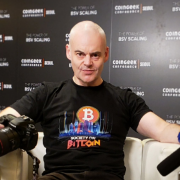In a surprise move, Bitcoin creator Dr. Craig S. Wright has returned to the public square with a new Twitter account.
His new Twitter account, @Dr_CSWright, appeared on February 5, 2022. So far it has only a handful of tweets and Dr. Wright hasn’t engaged in the replies. These are predictably heavy with BTC proponents posting lowbrow responses containing long-debunked claims, insults, and accusations rather than actual arguments.
Emboldened by his recent victory in the Kleiman vs. Wright trial and the departure of adversarial Twitter CEO Jack Dorsey, Dr. Wright has decided to return to the platform where he first began to spread his message—originally under the name “Professor Faustus.”
That account suddenly and mysteriously disappeared from Twitter in March 2019. People were unsure whose decision it was; whether Wright had had enough of social media arguments or if Twitter itself was responsible. He later revealed that Twitter had removed the account and deleted its archive, which prevented others reading his extensive history of posts.
In a 2018 blog post titled “Why I Troll,” Dr. Wright said, “I should not troll on Twitter, but I do enjoy it.”
Where else can you find Satoshi’s own comments?
Since then, the only place to hear Dr. Wright’s opinions was on his personal blog at CraigWright.net, or his less-filtered account on MetaNetICU’s Slack channel. Whether his new Twitter account will have the same spirit as MetaNetICU’s more BSV-friendly, subscriber-only conversation remains to be seen.
Dr. Wright has also pointed out that he (as Satoshi Nakamoto) never posted on the popular forum BitcoinTalk. Although that site has a large archive of “Satoshi” posts, the forum originally existed on the original bitcoin.org domain. Its data was migrated to BitcoinTalk.org some time in 2011, and Wright says some of the posts have likely been altered (or new ones added). That said, many of Satoshi’s comments contain elements of Dr. Wright’s philosophy and he has subsequently expanded on them.
For the truth, read Satoshi’s blog
Probably the best place to gain a meaningful insight into Satoshi’s thoughts on Bitcoin is Dr. Wright’s personal blog. The words aren’t as off-the-cuff as Twitter or MetaNetICU, but they’re probably more educational for anyone seriously looking for a deeper understanding of Bitcoin.
For example, Dr. Wright’s latest blog post is titled “The Wizard of Blockchain,” and deals with issues that have been fundamental to Bitcoin literally since its first appearance: scaling and decentralization.
First, he takes Ethereum to task for its own scaling attempts, describing why its developers have run into several issues in their years of bolting on solutions to the protocol. This has added layers of complexity to an already-ambitiously complex network, one that attempts to perform actual computation across a decentralized network. Its technique of “sharding” different segments of transaction data across thousands of processors creates a nightmare for any system trying to keep records in sync, he wrote.
The only method for scaling any blockchain network lies in every single node running every single transaction.
He also clarified the concept of “decentralization,” which many BTC supporters claim means millions of individual miners (processors) working to confirm transactions. Since small miners are unlikely to ever confirm a transaction block by themselves, most belong to pool networks which share out the rewards in return for computing power. This means the pool itself is the “miner,” not each participant. Dr. Wright points out this means the entire BTC network in reality has only 14 nodes that are actually creating blocks, and thus only 14 mining nodes.
The true meaning of decentralization concerns who is able to make or change the protocol rules, he said.
“Decentralisation simply requires that nobody can change the protocol. When you create something with nobody in charge, the events require multiple parties, and not a single developer group, to interact for any enforcement.”
Most people know little about “the group that is behind the curtain” at BTC, he added, and thus we don’t know their true intentions. BTC’s core developer group is also very small. Dr. Wright, who says he does know a lot about these intentions, considers the group to be bad actors.
“They are the proverbial wizards who seek to tell you how different Bitcoin is from what I designed. The same people say that Bitcoin is decentralised, because they control it.”
BSV, on the other hand, has “set in stone” protocol rules that cannot be altered from what they are today (and indeed, were at the beginning of Bitcoin). This is the true essence of decentralization, and is the reason BSV is superior to both “private blockchains” (which are a “false claim” by themselves) and even today’s legacy financial system.
Watch: Dr. Craig Wright’s keynote speech at CoinGeek New York, Time is a Personal Experience
New to blockchain? Check out CoinGeek’s Blockchain for Beginners section, the ultimate resource guide to learn more about blockchain technology.









